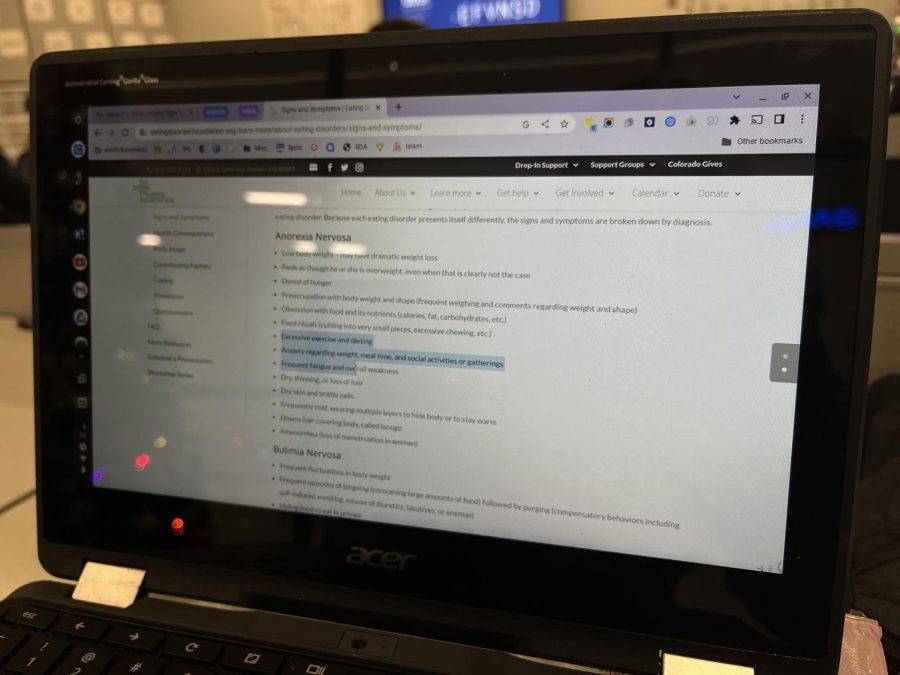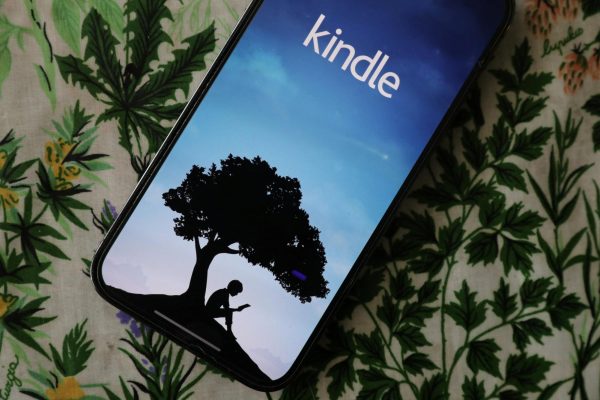Self-diagnosis is harmful practice
Thorough Looking A student looks up the diagnosis criteria of Anorexia Nervosa. One of the best ways to self-refer is by looking up the diagnosis criteria for disorders and applying them to oneself.
It’s difficult to avoid mental health as a topic when using the internet. Signs of different disorders pop up left and right, people post advice on how others can better themselves and some claim to be experts on various topics. In the current time, it’s not uncommon for the wrong people to give out wrong information.
It is great for a person to know if he or she is struggling either with a mental or physical health issue. They can get resources on how to combat these issues and become a better person in doing so. The actual issue comes down to a simple claim of “I have…” with no actual professional guidance. Many people online and in the real world make claims about struggling with disorders, but they are self-diagnoses that come from little to no factual information.
Self diagnosing is the act in which a person claims to be dealing with an issue either physically or mentally without seeking professional expertise. The claim is purely based on the person’s own research and gathering of knowledge. An example of this would be people claiming to have an anxiety disorder when they realize they’ve started showing symptoms that an online source has told them about. This is not to be confused with self-referring, which is the act in which a person compares their symptoms to other disorders or diseases and becomes aware of what could potentially be wrong. Self-diagnosis claims while self-referring suggests.
Someone becoming aware of their own mind and body isn’t necessarily a bad thing. It’s great when someone can open their mind and connect with themselves on a better level. Self-diagnosis becomes an issue when the diagnosis is built on a quick Google search without following up with a professional.
Many people base their diagnosis on a Google search, talk with friends or a TikTok video. According to the Pew Research Center, 59 percent of adults in the U.S. used the internet as a source for health information, and 60 percent adults got information from their friends. This is concerning seeing as none of these methods are going to give exclusively factual information. Anyone can post a video on TikTok claiming to be an expert in any field and then proceed to list off completely wrong information. As friends are a resource to use, they aren’t always the best resources to get information from. Rumors spread and misinformation follows. Google is the only semi-reliable place to look for research that isn’t a book or professional. Some of the best websites being American Psychological Association, WebMD and the Mayo Clinic. Besides the listed sources, it’s always better to look for trusted websites with .edu, .gov or .org. Although .com is an easier find, they aren’t always filled with the best information.
Even with the well known knowledge of trusted sources, not everyone listens. People often look around the internet for a few minutes before becoming certain they’re dealing with one particular issue. This can be extremely dangerous and detrimental. One of the main reasons self diagnosis can be so harmful is that it could be a wrong guess. Many diseases and disorders have similar symptoms. A pain in the leg could be dehydration or cancer, and feeling down could be a deep state of depression or a bad day. Of course, all these issues need to be addressed, but some are more severe than others. When someone is treating the wrong diagnosis, it can only cause more harm. The actual issue isn’t being addressed and the person is left to wonder why when they’ve spent so much time trying to fix it.
Sometimes this wrong diagnosis can also be completely different than what is previously guessed. A mental diagnosis could be a physical issue in some cases. Someone may mistake a rapid heartbeat and anxious brain as an anxiety disorder, when it could be a heart disease. Although neither are preferred disorders to have to deal with, one is much more life threatening than the other.
Self-diagnosis can also cause someone to try and help themselves rather than seeking out professional help. This can be extremely harmful, especially in cases where the disorder or disease is more severe or life threatening. Some people don’t want to take the time, or don’t have the money, to go to a professional and get themselves fixed. Instead, they look up ways to deal with it at home. Some advice can be good like eating healthy foods, getting rest and exercising. If the issue is more than just a lack of nutrients, then the problem gets worse. Although it may be easier to self research a diagnosis, it’s less problematic in the long run to talk to a professional.
Claiming to have some type of problem can also build into stereotypes and stigma around that specific issue. Dissociative Identity Disorder (DID) was a common topic of many videos I saw on TikTok when I was still an avid user of the app last year. Of course, the algorithm showed me numerous videos on the topic. Of course, not everything I saw was factual, and some information was even contradicting. What I did see a repetition of was people claiming to have the disorder. In some cases, these people did in fact deal with DID. In other cases, however, the claims were built off information they saw online. If the information someone is getting isn’t factual, it causes a false diagnosis and only plays into the stigma that surrounds that disorder. Many people were leaving hate comments on a video posted by someone who had a medical diagnosis done, but the comments were always about how rare the disorder was and how people shouldn’t be faking it. It’s understandable when people get upset, but the comments can cause so much unnecessary stress on a person who is already dealing with so many other things. If people stopped claiming to have disorders they didn’t, less people would not feel the need to spit out harmful comments onto people who are actually struggling with that specific disorder.
Another issue that often comes from self-diagnosis is that people don’t try to work toward a better self. In some cases, people want labels to be able to claim as their own. They find out they fit the box of a certain disorder, claim to have it and then do nothing to help themselves. But someone wouldn’t break their leg and simply just announce it. That’s when they go seek medical care, go through an evaluation, get a diagnosis and then receive the help they need. The lack of having professionals involved means there’s also a lack of reaching a goal to fix this issue.
Some have made the argument that self-diagnosis can be good for people who don’t have the right resources or money to seek professional help. That argument doesn’t hold up in most cases. If a person can’t get the help they need, that doesn’t mean they have to self-diagnose. People can self-refer themselves which is a much healthier and safer option that lets the person become aware of symptoms without being blinded by one guess. People can also use credible sources on how to help themselves or find communities that will help them combat the symptoms that they are worried about.
Some great resources at the school would be talking to one of the counselors or teachers about an issue a student is facing. There are also numbers and hotlines a person can call for advice and information. Nurses can help suggest a student seeks out medical professionals if they see it as necessary as well. If someone is curious about their own mental or physical health, the library has books on various topics and a database with credible sources.
Although it’s great for a person to have an understanding of what is going on with them physically or mentally, a person should not rely strictly on web based findings. It’s much safer and smarter to talk to a professional about issues, as it could be detrimental to a person’s health.

Hello! My name is Lillian, or Lily, and I'm one of the Editor in Chiefs of the Mountain Echo. I've been writing since my sophomore year for the Mountain...







